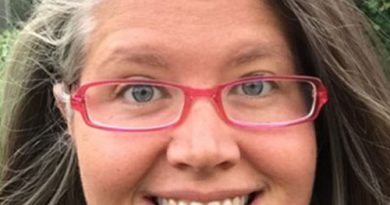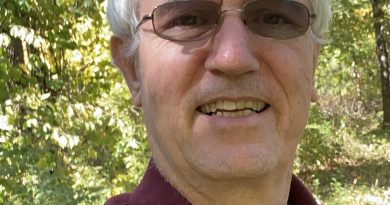
Experiential Learning in Astronomy and Beyond
By Nicholas Covaleski, Assistant Director at CELT
This interview is with Dr. Andrew West, Lecturer in the Department of Chemistry and the Tufts Prison Initiative (TUPIT). Nick chatted with Andrew to learn more about how he is using experiential approaches in his teaching, his motivations for doing so, and what insights he might have for other Tufts faculty who are interested in experiential education.
Can you start by telling us a bit about yourself and the courses you’re teaching this year?
Andrew: I’m trained as an astronomer. At Tufts, I co-teach a class every semester (with archaeologist Lauren Sullivan and a rotating chemist) called Big Bang to Humankind. It’s a broad, interdisciplinary science survey course that covers astronomy, geology, chemistry, biology, and anthropology––all in one semester. It’s kind of like a highlight show of the sciences, but we work hard to show how those disciplines connect and to help students understand the process of science itself.
This semester, I’m also teaching an ExCollege course on the Apollo missions, which explores the science behind the moon and what we learned from those human missions in the 1960s and 70s. And in the spring, I’ll be teaching Alien Worlds through the Tufts Prison Initiative (TUPIT), which is all about the numerous planets we’ve been finding around other stars.
You’ve put a lot of thought into experiential learning. Can you share an example of how you use it in your classes?
Andrew: During the fall 2002 semester of Big Bang to Humankind, we replaced the third exam with a museum-based project. Instead of studying for another test, students take a trip to the Harvard Museum of Natural History, which is like a big sandbox for them to play in, using tools from the course. Rather than telling students the exact exhibits they need to see, they are able to curate their own experience. They wander through the museum and find a certain number of exhibits that they think relate to topics from class, whether it be the Big Bang, or the formation of planets, or climate, or the chemistry of photosynthesis. Afterward, they write a bit about how they see those exhibits relating, and then reflect on how the class influenced their visit and what they learned more generally. We also ask them to identify their favorite exhibit, even if it’s unrelated to the course.
It’s been remarkable to read their reflections. Many students write that they’ve never looked at museum exhibits so closely, and that they think critically about the material in a way they never did before. Some might read a plaque, for example, and realize that the dates are wrong, because when the plaque was made thirty years ago we knew something different than what we know now. Others reflect on how artifacts were acquired, especially in the anthropology collections, which connects to conversations we have in class about the ethics of acquiring cultural material.
Ultimately, it’s a form of self-assessment. Rather than us evaluating them through an exam, they evaluate their own learning through engaging in and reflecting upon an experience.
How has that assignment evolved over time?
Andrew: Early on, it was a bit too structured, like a laundry list of things to do. I would ask them to find twenty objects and then fit them into different categories. But over time it has become more open-ended. I still ask them to find five objects that relate to the class and one object that doesn’t, but the experience is much more self-curated. Interestingly, I have found that students actually really struggle with finding an object that doesn’t relate to class. That realization itself becomes a learning moment, as they begin to synthesize course material and see all the interconnections between scientific fields and concepts.
What do you see as the main benefits of this kind of experiential approach for you and your students?
Andrew: I mean, practically, for me, it’s way more fun to grade! It’s still a lot of work––I typically have to read 150-200 reflections––but after reading the majority of them, I can tell that the students’ learning is just so much more profound as compared to when I’m marking an exam. Students will write about how much they didn’t realize they had learned in the class, or about taking their parents to the museum and being able to tell them everything about the exhibits. And it gives students agency. Obviously it’s a required assignment, and as the instructor I want to see them making connections to the course, but I’m less the “sage on the stage” and more the “guide on the side,” helping students curate their own knowledge rather than performing it for me.
What advice would you offer to other faculty who want to integrate experiential learning into their teaching?
Andrew: I would say start small. In my Apollo course, for example, I’m having all students keep a moon journal. Each night, they go outside, look for the moon, and sketch it and take notes of where it is. The idea isn’t for them to be able to make detailed calculations of the orbit of the moon, but I want them to have some experience of where the moon is in the sky, when it’s not in the sky, how it’s moving, and what phase it’s in, so that by the end of the class––after we’ve talked all about the adventures of the Apollo astronauts and the geology and physics of the moon––they will have also experienced some of that just by going out and looking. It’s a simple exercise, but I think there’s great power in them stopping for a moment and going to look for the moon.
So, It doesn’t need to be a huge end-of-semester project. I’d encourage people to try out different low-stakes activities and treat it kind of like an experiment. I tell my students that science is always changing, and so is teaching. Just as scientists test hypotheses, we can test approaches to teaching. In that spirit, I ask them not only to reflect on the experience itself but also on how I could do it differently next time. I want to model the scientific mindset and demonstrate to them that I really do want their feedback, because we’re trying this out, and even if it’s mostly positive, they may have amazing suggestions on how to improve it.
See also



